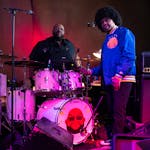HIP-HOP
Lil Uzi Vert, "Luv Is Rage 2" (Atlantic)
Listen to hip-hop in 2017 and hear the darndest things. There are rappers who rap in only occasional, seemingly random bursts. There are rappers who mainline the aesthetic and vibrating energy of punk. And there are surrealists who stretch out words and melodies like taffy.
The genre is arriving at its Dalí phase, when all the old frameworks — formalist lyricism, soul music DNA, mainstream pop ambition — are melting into something only half-recognizable.
It all makes for a funhouse take on the genre, and its current ringleader is Lil Uzi Vert, who has released his best album, on the heels of his breakout hit "XO Tour Llif3," a bitter and cheeky song about recrimination that's part punchy rap, part dreamy R&B and part melodic hardcore, which went from a post on SoundCloud to No. 7 on the Billboard Hot 100. The album is No. 1 this week on Billboard.
As much as any album — some of Young Thug's surrealist mixtapes and albums come closest — "Luv Is Rage 2" encapsulates the moment, chaotic and slippery. Lil Uzi Vert is an intensely charismatic and unpredictable presence. One minute he is sweetly singing; the next, bleating; then he is rapping in tightly clustered sneezes. As structures go, he is lackadaisical. He raps and sings with the confidence of someone who knows that generations before him have made the rules, and also played by them, freeing him up to ignore them altogether.
In places, he is something close to a conventional rapper — on "Dark Queen," about his mother, and "For Real" — but he is just as likely to embody screamo and emo, spiritualized funk or abstract, pointillist pop. When he raps, he's almost gruff, but when he sings, he's sweet, whimsical, dreamy.
He is also petulant. Some of Lil Uzi Vert's most vivid breakthrough moments haven't been songs, they have been tiny bursts of attitude and sass: his tantalizing string of anti-interviews, including his recent stalemate with Zane Lowe, and gifs that telegraph his carefree energy — a saucy shoulder shimmy at the VMAs, jumping from atop a soundbooth into a raucous crowd of thousands at the Rolling Loud Festival in Miami in May.
Accordingly, his most urgent lyrics are about the depth of his indifference, and on this album, large swaths of which are about the collapse of a relationship ("X"), there is plenty of that. On the sparkly "How to Talk," he's breezy and snooty.
Broadly, though, on this album, his songwriting is less specific than ever: He loves fashion, loves Ferraris, loves your girl. To call "Luv Is Rage 2" inconsistent is the sort of critique that this album (and Lil Uzi Vert in general) seems to sneer at — that it can still thrive even at its most casual is its charm.
But inconsistent it is. Few songs here achieve the structural elegance of "XO Tour Llif3"; it's almost jarring when the Weeknd shows up on the excellent "Unfazed," a creamy, dirge-like collaboration. The only other collaboration on the album better represents the current moment: "Neon Guts" is produced by and features Pharrell Williams, perhaps the most rigorous presence in hip-hop of the 2000s. But around Lil Uzi Vert, his beats are corroded, his lyrics clipped and tight. He feels the tides changing, and wants to swim.
"Luv Is Rage 2" may be the breakthrough moment for this approach to the genre, but it is also an early-warning system for a coming wave: the generation of rappers who have made SoundCloud their home and petri dish, and who refract their approach to hip-hop through a Warped Tour lens.
Jon caramanica, New York Times
new releases
• Thomas Rhett, "Life Changes"
• Neil Young, "Hitchhiker"
• The National, "Sleep Well Beast"
• Jack Johnson, "All the Light Above It Too"
• Gregg Allman, "Southern Blood"
• Tori Amos, "Native Invader"
• Deerhoof, "Mountain Moves"
• Toby Keith, "The Bus Songs"




